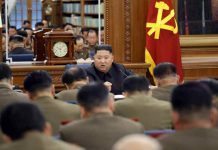The moment Kim Jong Eun failed to attend the second round of
the 13th meeting of the Supreme People’s Assembly on September 25th, rumors
quickly spread regarding “Kim Jong Eun’s health issues”. Two days prior, a
daily newspaper had taken the forefronts of reports with a serious article
stating that Kim Jong Eun’s whereabouts have been in a fog for 22 days. Stories
of a “Kim Jong Eun accident” even floated throughout Chinese social media sites.
This is a case that reveals just how easy it is for
conspiracies to sprout in a veiled system. It’s not an overstatement to say
that the front page newspaper publication (Joongang Daily, September 26th) of a
picture showing the change in attendees of the Supreme People’s Assembly that
gathered for the first time in five months is strong evidence for South Korea’s
hopes for change in North Korea. And they are always hoping that in the center
of that change will be the supreme leader of North Korea.
What is change? In a closed system with a peculiar and
merciless ruling structure of no precedent like North Korea, what does change
mean and what can be defined as change? Can Kim Jong Eun’s absence and frequent
change of the ruling elite be considered determining factors of system change
(or instability)?
Scholars have three criteria for measuring change in a
communist state. The first is the restoration of private property, the second
is the acknowledgement of profit, and the third is the introduction of the
market system. These three are like a trinity that explains a single
characteristic of capitalist economy from varying angles. This is because there
must be a market for profit to occur and the conceptualization of profit is not
possible without the recognition of private property. Marx-Engels did away with
all three from mankind.
Recent trends of North Korea have become heavier with signs
that definitely qualify as change. It may not be to the degree of a capitalist
system but partial marketization is clear in actions such as a certain amount
of recognition for private property and profit in order to increase motivation
for production. Kim Jong Eun’s June 28th policies are no different from a test
declaration about these changes. And still, whether indicators of small change
will lead to fundamental changes in the system is an entirely separate matter.
So where could have Kim Jong Eun have gone? Could he be on a
special diet because of side effects from obesity like some have guessed? Could
he be receiving hospitalized care for gout like doctors have supposed and
diagnosed? Or could there really have been some sort of accident like the
ambiguous rumors have said? Tabloids in Yeoido are quickly looking into this
tacit knowledge. There is no way to know the truth.
What’s certain is the fact that Kim Jong Eun’s “absence”
won’t be a big variable in change in North Korea’s system. That may be why KCNA
“unprecedentedly” and “immediately” acknowledged Kim Jong Eun’s health issues.
In North Korea’s praise that “despite his discomfort, the path of a leader working
for his people blazes forward like fireworks,” it’s possible to feel the sorrow
of “great leader” who is no longer able remain a target of deification.
If it were times past during the era of Kim Il Sung
and Kim Jong Il, would North Korea’s public media have boldly made the
same acknowledgement so quickly while using humanizing expressions such as
“discomfort? The “father of the people” could not be such a weak individual
because he was a “great leader” who could not get sick easily. Could it be that
after the hereditary succession of three generations, the North Korean system
has accepted that “the dear leader comrade” is not longer able to remain in a
status of idolization?
Some experts have attempted to make positive analyses
stating that this is circumstantial evidence that the North Korean system has
entered a stable period. Well, it certainly would have been unimaginable in the
past so that does make some sense. Especially considering that until only
recently, someone who dared to publicly acknowledge health issues of the leader
comrade would have been thought the worst type of radical.
Kim Jong Eun’s absence (although probably unintentional) at
least calmly reveals change in the North Korean system’s consciousness. This
means a ruler who has dropped to the same mere mortals; a leader who has become
more human and has come down from the status of god to someone standing on
earth with the same pain and suffering as his people.
Could it be that this consciousness is smoothing over Kim
Jong Eun’s break away from the line of “great and dear leaders” Kim Il Sung and
Kim Jong Il and fall to the exhaustion of devastating reality? Perhaps it’s
only a matter of time before the fall of all idols. The modern 21st century is
unreservedly recording the fall of numerous idols. And this is why I already
pity his final days. Change in North Korea can’t turn back now.
* Views expressed in Guest Columns do not necessarily
reflect those of Daily NK.




















